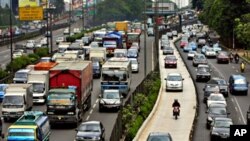With a population of nearly 10 million people, the Indonesian capital Jakarta is bursting through its seams. To solve the overcrowding, politicians are reconsidering an old idea – moving the capital to another part of the country.
The rainy season is under way in Indonesia, and that signals trouble ahead. In normal times, the average car on Jakarta's streets crawls at a meager 8.3 kilometers an hour. But when it rains, traffic can stand still for hours as young men wade knee deep in water trying budge cars and buses.
Congestion costs
By some estimates the congestion on Jakarta's streets cost as much as $1.4 billion a year in idle hours wasted away.
There are other problems with crowding – the city is badly polluted, it has trouble finding clean water and because it is on swampy land near the ocean, it is vulnerable to rising ocean levels.
So President Susilo Bambang Yudhoyono last year called for a study on moving the capital away from the congestion.
Jakarta Governor Fauzi Bowo is not convinced the idea will improve conditions in the country's largest city.
"I would be happy if some of the central government premises would be moved outside Jakarta, but it doesn't mean that the problems of Jakarta would be lessened," Bowo said.
The problems do not show signs of easing any time soon. Every day, more than 500 new cars and 1,500 new motorbikes are registered in Jakarta, while the effort to build an integrated public transportation system is behind schedule. In addition to those who live in the city, every day more than a million travel in from the suburbs to work or study.
Crumbling infrastructure
The city does not have enough roads to accommodate its commuters, and its crumbling infrastructure compounds to the problem. Last month, a stretch of highway collapsed for lack of maintenance, causing a traffic jam that lasted hours near the country's main harbor.
But urban planning expert Marco Kusumawijaya says moving the capital from the city is not the solution.
"At the most, there is only 350 000 public servants, and I think maybe 10 or 15 percent of them are using cars. So I think it is delusional in the sense that it is not based on the actual causes of traffic jam that we want to solve," said Kusumawijaya.
Solution to the problem
Indonesia's first president, Sukarno, thought of moving the capital to Palangkaraya, a city on Borneo island. That was in the 1950's, long before Jakarta had a traffic problem.
Palangkaraya was an option for several reasons: it sits in the heart of the sprawling archipelago, away from quake-prone areas and the densely populated island of Java, where most of the population and the economic and political powers are concentrated.
The government later considered another city on Java. But neither plan moved forward.
Palangkaraya is back in the running today to become Indonesia's next capital. The government, however, is weighing the cost of a move – which could top $11 billion dollars, against the cost of improving Jakarta's infrastructure.




